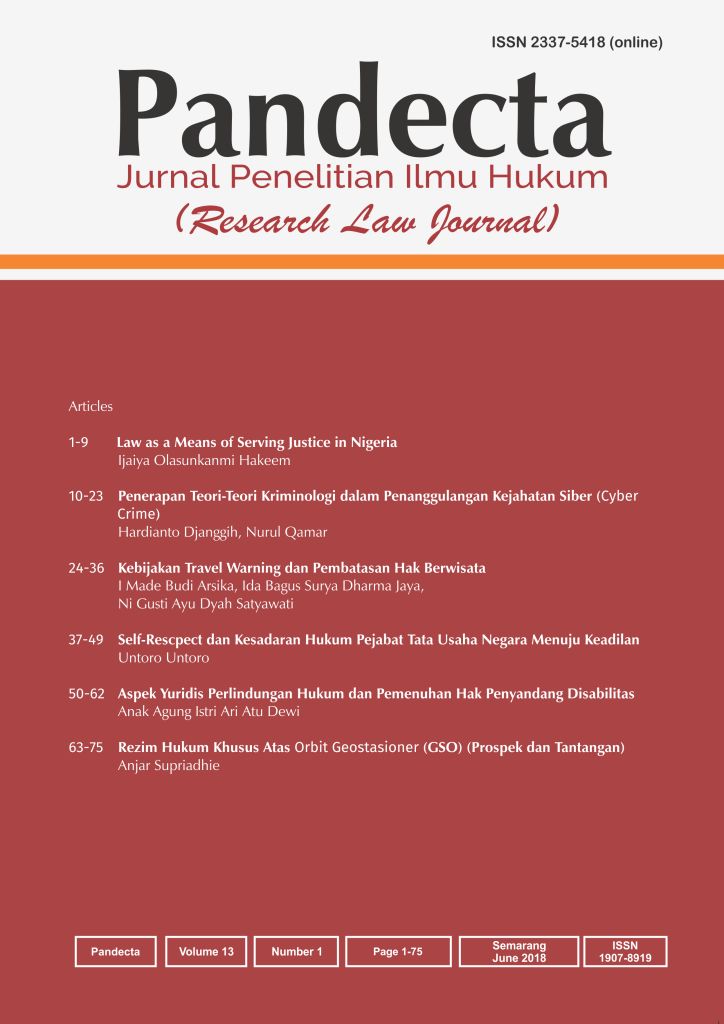Pengembangan Ilmu Hukum Berbasis Religiuos Science: Dekonstruksi Filsosofis Pemikiran Hukum Positivistik
(1) Jl. Tamansiswa No. 158 Yogyakarta, Indonesia
Abstract
This study aims to examine the role of religion in the development of the law amid the various crises of justice in public life today. The study approach is concepts. The data used is secondary data sourced from academic studies in the field of legal science. The results of this study indicate that religion as a way of life, the ideology of the state and / or culture has a strong justification for the development of alternative sources of law in the future. Universal values ​​of religion are very close to substantive justice that has not been much to get the proportions in the practice of law based on the positivistic tradition. In the tradition of that justice which is reflected in the mechanical verdict with reference to the sound of the legislation, in many cases people have been injured sense of justice. Therefore, the approach to religion that does not take into account the dimensions of the human mind is limited, also rely on the revelation that is revealed as a reference. In this context, Pancasila has recorded several tracks of thought is very important as a basis for compromise reinforced the development of the law.
Keywords
Full Text:
PDFReferences
Al-Faruqi, I.R. 1981. Tawhid: Its Implications for Thought and Life, International Institute of Islamic Thought, Polygraphic Sdn Kuala Lumpur
Asshiddiqie, J. 2005. Konstitusi & Konstitusionalisme Indonesia, Jakarta, Konstitusi Press
Audry, P., Navianto, I., Sinal, M., dan Sutoyo., (eds), 2010. Religiousitas Sains Meretas Jalan Menuju Peradaban Zaman (Diskursus Filsafat Ilmu), Malang, Universitas Brawijaya Press dan Solusi LPPSDM
Brock, G. 2009. Global Justice: A Cosmopolitan Account, Oxford University Press
Cane, P. dan Conaghan, J. (eds), 2008. The New Oxford Companion to Law, Oxford University Press
Cotran, E. dan Sherif, A.O. (eds), 1999. Democracy, Ther Rule of Law and Islam, Centre of Islamic and Middle Eastern Law (CIMEL), School of Oriental and of African Studies (SOAS), University of London, Kluwer Law International
Darwin, C. 1958. The Origin of Species: The Origin of Species with Special Introduction by Julian Huxley, United States of America, The New American Library
Fuller, G.E. 2010. A World Without Islam, United States of America, Hachette Book Group
Hasmi, T. dan Mutalib, H. (eds), 1994. Islam, Muslims and The Modern State, Macmillan Press Ltd
Hooker, M.B. 2008. Indonesian Syariah: Defining a National School of Islamic Law, Singapore, Institute of Southeast Asian Studies (ISEAS) Publshing
Hosen, N. 2007. Shari`a & Constitutional Reform in Indonesia, Singapore, Institute of Southeast Asian Studies
Iskandar, P. dan Thontowi, J. 2006. Hukum Internasional Kontemporer, Bandung, Refika Aditama Press, 2006
Iskandar, P. dan Yudi J. 2011. Memahami Hukum di Indonesia; Sebuah Korelasi antara Politik, Filsafat dan Globalisasi, Cianjur, IMR Press, 2011
Komisi Hukum Nasional, Kebijakan Reformasi Hukum; Suatu Rekomendasi 1 & 2, Komisi Hukum Nasional Republik Indonesia, 2010
Lapidus, I.M. 1988. A History of Islamic Societies, Cambridge University Press
Moinuddin, H. 1987. The Character of The Islamic Conference; The Legal and Economic Framework, Clarendon Press Oxford, 1987
Moyo, D. 2011. How The West Was Lost, United Kingdom, Allen Lane The Penguin Group
Muhammad, A.K. 2004. Hukum dan Penelitian Hukum. PT Citra Aditya Bakti. Bandung
Parkinson, G.H.R., (ed), 1993. The Renaissance and Seventeenth-century Rationalism, London and New York, Routledge Taylor & Francis Group
Rouland, N. 1994. Legal Anthropology, London, The Athlone Press, 1994
Shaw, M.N. 1997. International Law 4th edition, United Kingdom, Cambridge University Press, 1997
Soemitro, R.H. 1985. Metodologi Penelitian Hukum. Ghalia Indonesia. Jakarta Timur
Syamsudin, M. 2007. Operasionalisasi Penelitian Hukum. PT RajaGrafindo Persada. Jakarta
Taylor, C.C.W., (ed), 1997. From The Beginnning to Plato, London and New York, Routledge Taylor & Francis Group. 1997
Thontowi, J. 2007. Hukum, Kekerasan & Kearifan Lokal: Penyelesaian Sengketa di Sulawesi Utara, Yogyakarta, Pustaka Fahima Press
Thontowi, J. 2009. Penegakan Hukum & Diplomasi Pemerintahan SBY, Yogyakarta, Leutika Press, 2009
Twining, W. 2000. Globalisation and Legal Theory, United Kingdom, Butterworths
Unger, R.M. 1986. The Critical Legal Studies Movement, Harvard University Press
Refbacks
- There are currently no refbacks.


